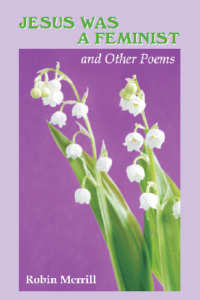Jesus Was a Feminist and other Poems and Same Old Story
 Jesus Was a Feminist and other Poems,
Jesus Was a Feminist and other Poems,
by Robin Merrill,
Moon Pie Press, 2014,
36 pages, paper, $12,
ISBN: 978-1-4951-0361-2
Buy the Book
 Same Old Story,
Same Old Story,
by Dawn Potter,
Cavan Kerry Press, 2014,
87 pages, paper, $16,
ISBN: 978-1-933880-40-2
Buy the Book
Earlier this year, poets Dawn Potter and Robin Merrill both came out with new books. They write very different poems. But because they both write about rural Maine, about the tough lives of those who live on the margins, and about the place of women in a predominantly male culture, they are an excellent study in the difference between spoken word /slam poetry and formal lyrical verse.
With a slam poet — and Merrill is one of the best — the pace of the poem rushes forward as if it can’t delay, and, if it does, the race is off. She uses, as any skilled public speaker, a range of rhetoric techniques to heighten the intensity of the poem and to press it toward its conclusion. In a poem “Hello Wagon,” about getting sober, she spills out her feelings using anaphora and parallelism. Notice how quickly these lines read:
I don’t care what those dastardly demons put in our path
what hurdles, what cliffs, what fire-breathing dragons. . . .
I don’t care what ghosts pay me a visit.
For Potter, in contrast, in her poem “Son-In-Law” about a ne’er-do-well young man, the poem thrives in the delicious hesitations, the gradual building up of a sentence, even the break of a stanza, so that it can spring open and release. Her parallelism is used to set a scene:
. . . while she was emptying last year’s freezer-wizened beans
into the chicken pail, while she was counting
cans of juice and packages of pork chops.
Here the two subordinate clauses are packed with elaborate details and with activities that ask us to dwell on an image. In the third-person voice, the poem lets us watch the woman interact with her son-in-law and, by the exchange of words, we find that he’s still like “The boy he used to be, / the one she recalls at summer Bible School, / pouring Kool-Aid on her little girl. . . . ” There’s no rush to the startling, painful conclusion of the poem. Like a fine musician of words, she lets each word note sound its distinct tone to create its full harmony.
But when Merrill introduces love in “Louisiana Sharecropper’s Chapel,” we’re flung immediately into a moment with a sentence that runs everything together:
And often, I’d only be across the aisle, my tongue so far down
Steve Davis’s throat that I could taste the black licorice he’d snuck
the night before.
Full of lovely sensual details, these lines leap into sexuality with him “unbuttoning that thrift store dress” and her, in church, “calming [her] breathing lest the deacons think” she’s “been touch by the Spirit.” With humor and directness, we experience sensuality with no brakes on. Potter, however, lets the love moment unfold itself line by line, the sentence pulled apart so every move is distinct and gradual, as in her poem “Letter to Will”:
Last night he
Ran his hands
Through my hair,
Down the nape,
Of my neck,
Kissed me between
The shoulder blades,
And so on.
Her words aren’t in a rush. They linger over an image, as in “Dog in Winter” where the phrasing delays in revealing the subject for four lines: “Up the boggy headland, frozen now, where a stone fence / submerged in the snow and earth-sink hints at pasture / so long vanished that the woods are convinced / grassland never existed, two bodies climb. . . . ” Her poems relish delays.
But that does not make Merrill’s poems any less forceful. It’s just that the demands of spoken word, the way the format of a slam is set up — you have to recite in a minute or three minutes a poem that will grab the attention of the judges — delays and hesitations are the death knell of a poet. You need to get their attention and, in quick order, set up a situation, a narrator, and some tension that, after some elaboration, can be resolved quickly. So her poems tend to jump at you the way a salesman on the phone launches into a spiel.
Potter’s poems invite you on a leisurely walk on an unfamiliar pathway where, much to your surprise, you find, as in “Cinderella Story,” a dove:
She crouches, hogging the feeder tray,
pebble-eyed and jaunty despite the ice cube
that, for two arctic days, has encased her pink left foot
like an elegant cement overshoe.
Such description, finely hewn, is filled with delight. Yet Merrill, too, has a delight that is wholly refreshing, as her “Jesus Was a Feminist,” when she takes on organized religion and slams the self-righteous men who choose to use scriptures to censure women:
But as for this woman? I know that:
It was a woman who followed Jesus around, sleeping in caves.
It was woman who stayed at the cross when the men grew faint.
And it was women who returned to find an empty grave.
The spoken word demands that the poet grab her audience and speak to the point. And Merrill does. The lyric poet can take her time and weave her web of words around you so that you feel as if you’re rocking in them, carried away to places you’ve never been before. And Potter does. They both have much to offer the reader, and, in comparison, much to tell of their different poetic forms.
— Bruce Spang

